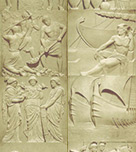Data Zoom
Facilitando o acesso aos microdados do Brasil


Coleção Wileman Brazilian Review
1898 - 1940
Professor da PUC-Rio fala ao The Economist sobre impactos do Novo Código Florestal Brasileiro
Publicado em: 06/06/2012
Environmental law in Brazil
The president’s effort to balance the claims of forests and farms has satisfied few. An opportunity to promote sustainable farming may be missed
SÃO PAULO
BRAZIL’S gridlocked Congress often ends up passing contentious laws only after the combatants collapse in exhaustion. So it is with the revision of the Forest Code, a set of rules that, despite the name, apply to all privately owned rural land, not just plots in wooded areas. The code, originally approved in 1965, requires owners to keep native vegetation on parts of their land—80% in the Amazon, less elsewhere—and in erosion-prone and biodiverse areas such as riverbanks and mangrove swamps. But it was long ignored.
![]()


